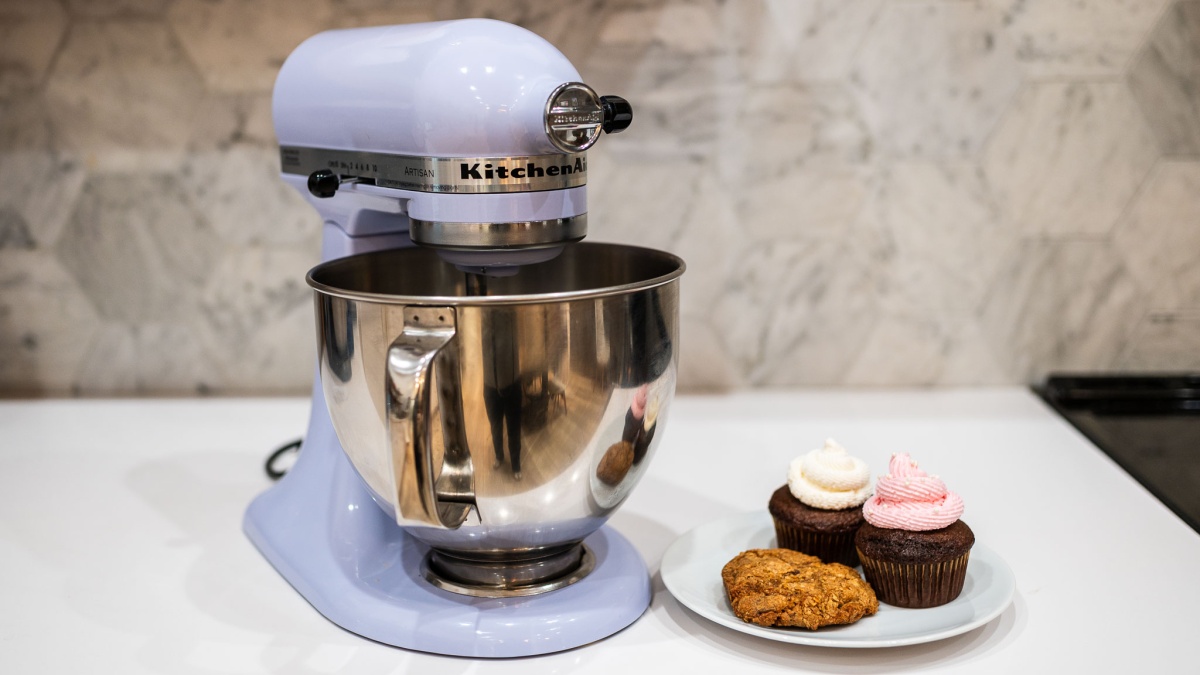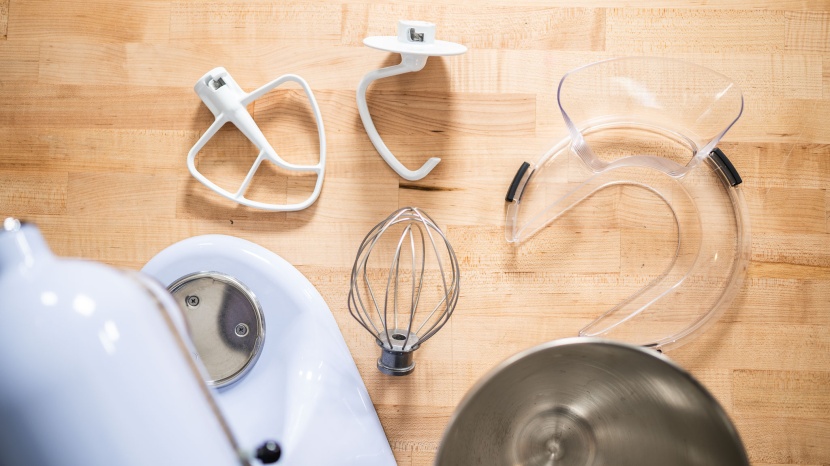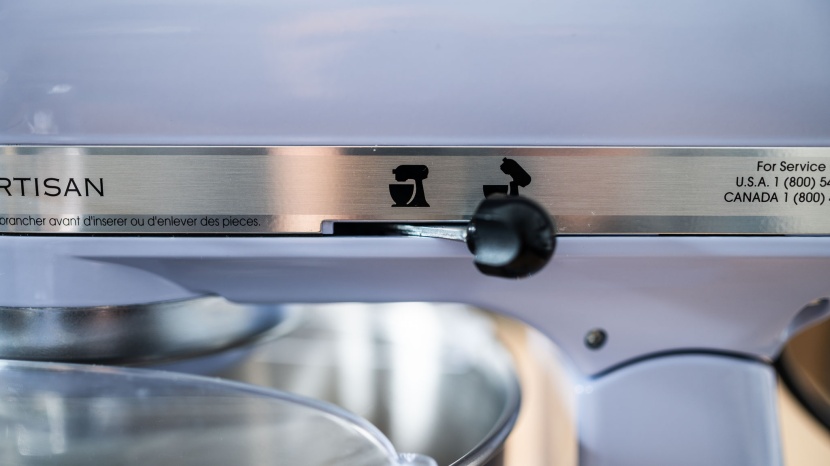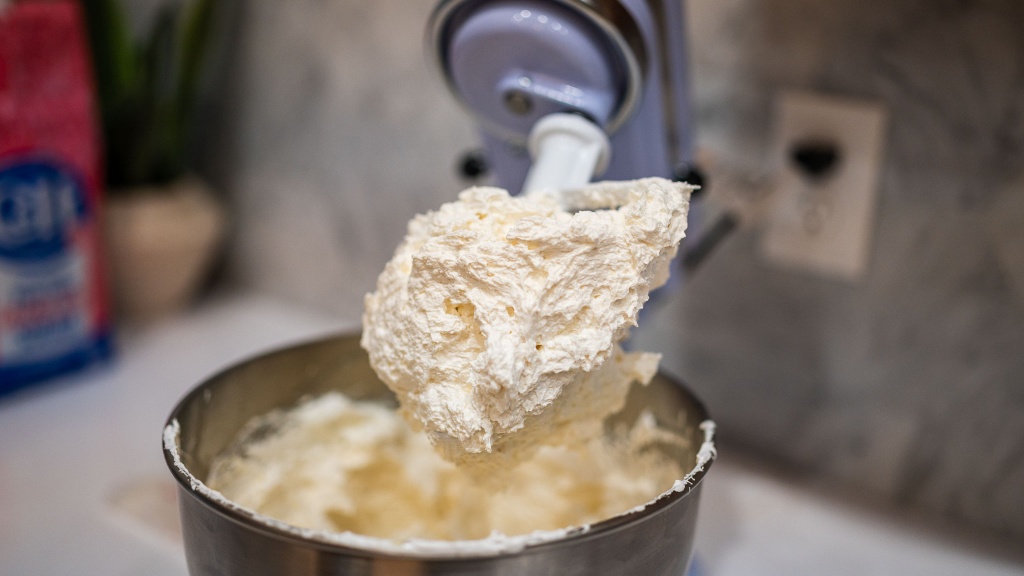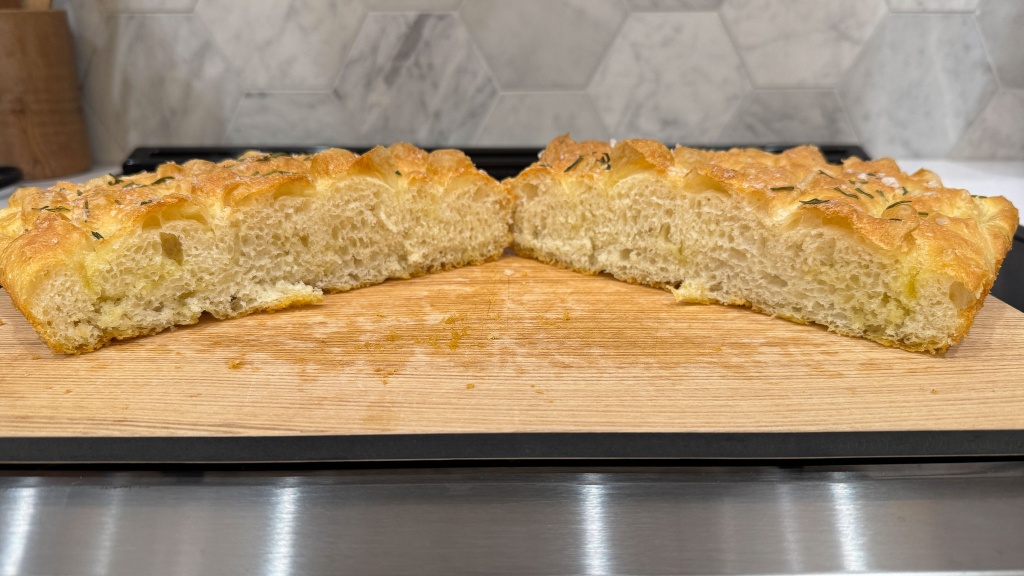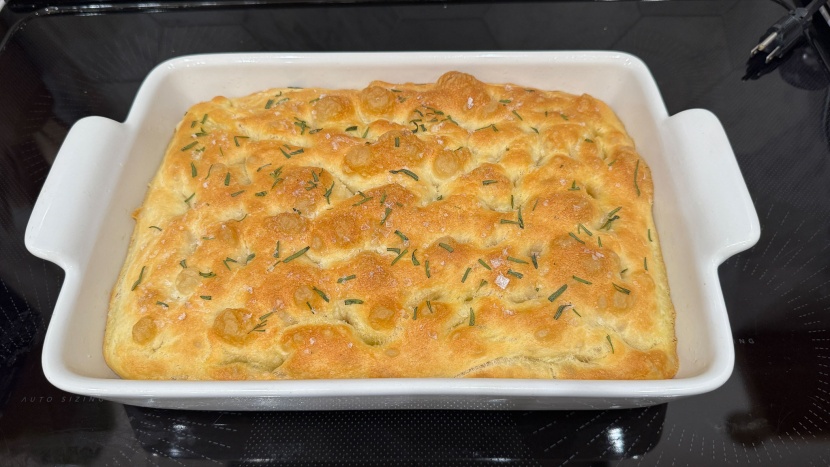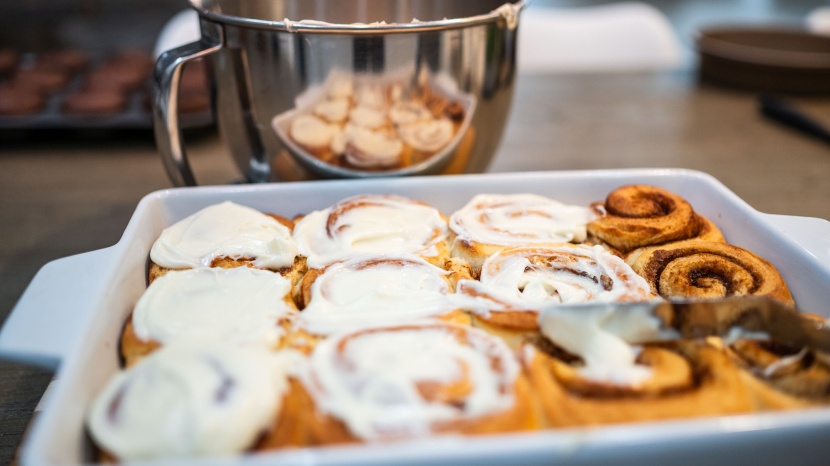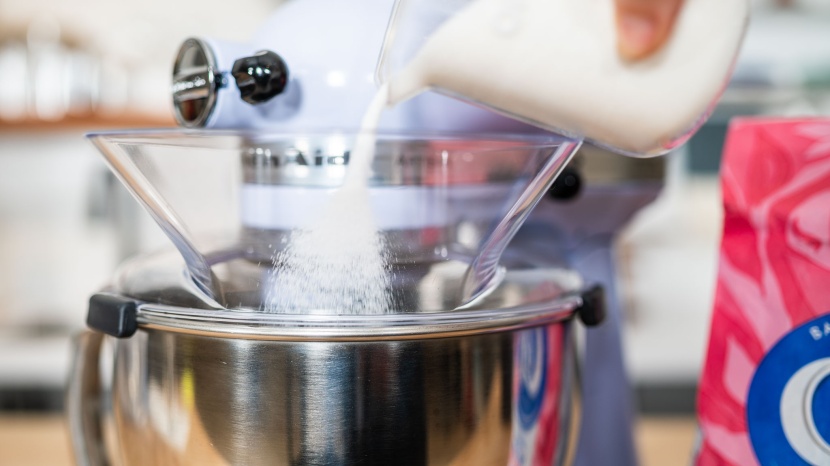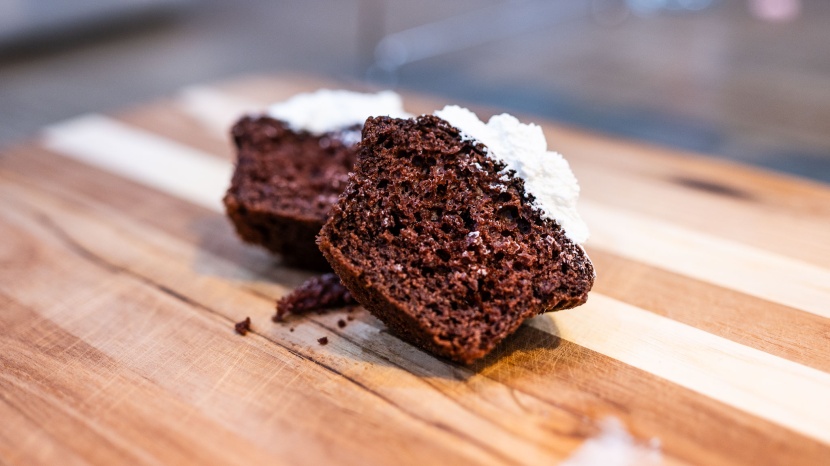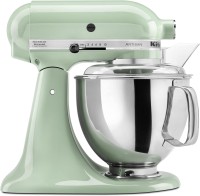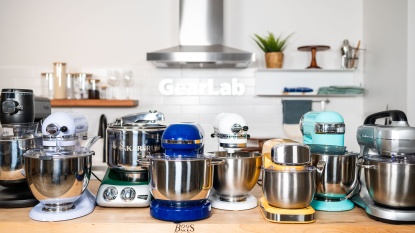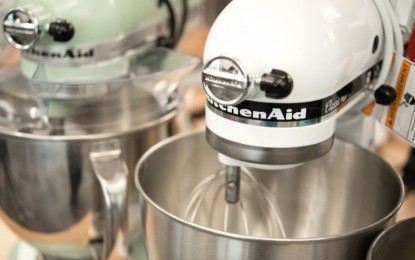
Our Verdict
Our Analysis and Test Results
Given its strong capability and ease of use, it is no wonder that the 5-quart KitchenAid Artisan is such a popular kitchen appliance among home bakers and wedding registries. There are a few tasks that this machine can't tackle with proficiency. Its standard attachments and planetary mixing will knead and mix to a high standard, while the sleek design is easy to clean. Moreover, you can purchase dozens of aftermarket attachments to meet any culinary desire. With over 40 colors and numerous aftermarket bowl options, this machine has style, too. Our tests revealed little to criticize, leading us to believe that this mixer will appeal to everyone from the casual baker to the creative home cook with many mouths to feed.
Ease of Use
I loved the KitchenAid Artisan's thoughtful design and user-friendly features. Unboxing reveals a complete package: a 5-quart stainless steel bowl, coated flat beater, coated dough hook, 6-wire whisk, and a pouring shield. Initial setup is straightforward, with no complicated assembly required.
The tilt-head mechanism operates via a lever on the right side with two positions: lock and unlock. When unlocked, the head can be raised for adding ingredients or changing attachments. I found that the head's weight keeps it tilted back naturally, though it doesn't lock in the raised position. One minor caution is that the head needs to be controlled when lowering, as it can come down rather forcefully if not guided.
One standout feature is the adjustable beater height. A screw under the tilt head allows you to increase or decrease the distance between the beater and bowl—a crucial adjustment for ensuring ingredients are thoroughly mixed. The manufacturer suggests the “dime test” to verify proper clearance: when correctly adjusted, the beater should gently move a dime around the bowl bottom as it rotates.
The 5-quart stainless steel bowl has a polished finish that's both attractive and functional. Its tapered design (8.5 inches at the top narrowing to about 3.5 inches at the bottom) works in harmony with the attachments, allowing them to reach very close to the bottom and sides. However, the bowl features just one vertical handle, which some users might find limiting when pouring heavy mixtures.
Cleanup is relatively straightforward, though not entirely effortless. The bowl, beater, dough hook, and pouring shield are dishwasher-safe, but the whisk must be hand-washed to preserve its function. The beater and dough hook are coated in food-grade polyester powder coating for non-stick performance and durability, though I've observed from long-term use that this coating can chip over the years.
The speed control offers 10 settings, though the odd-numbered speeds don't firmly lock into place. According to the manual, these intermediate positions provide finer adjustment when needed. KitchenAid backs the Artisan with a one-year full warranty, promising to replace the mixer if it fails within that period, with service options available after warranty expiration.
Whipping
The Artisan truly shines when it comes to whipping performance. When tasked with whipping cream, this mixer impressed us with both speed and consistency. For standard volume tests (1 cup of cream), the Artisan achieved stiff peaks in just 1 minute and 50 seconds—remarkably fast compared to many competitors. The result was perfectly whipped cream that doubled in volume and maintained an even texture throughout.
What sets the Artisan apart in whipping tasks is its well-designed whisk attachment. The 6-wire whisk almost touches the bottom of the bowl, ensuring that even small amounts of ingredients are properly incorporated. This proved especially valuable in our low-volume tests, where the Artisan whipped a mere half cup of cream to stiff peaks in 1 minute and 45 seconds. Many competing mixers struggle with smaller volumes, often requiring manual intervention to achieve consistent results.
The bowl's tapered design works in harmony with the whisk, allowing for excellent coverage from the bottom to the sides. The adjustable beater height also means you can fine-tune the clearance to suit different tasks. During our testing, I observed only a small gap (approximately 0.25 inches) between the whisk and the bowl's sides—minimizing the need for manual scraping and ensuring everything was properly incorporated.
Kneading
Kneading performance is crucial for bread makers, and the KitchenAid Artisan delivered excellent results in our dough tests. The mixer comes equipped with a C-shaped dough hook, which I found effective for both high-hydration and stiffer doughs.
When testing with a high-hydration focaccia dough—notoriously sticky and challenging to work with—the Artisan performed admirably. The C-shaped hook maintained good contact with the dough, though I did observe some initial sticking to the sides of the bowl. After a quick scrape-down of the sides, the mixer efficiently developed the gluten structure. The finished focaccia emerged from the oven beautifully bronzed and with an excellent crumb structure, a testament to the mixer's ability to properly develop the dough.
For our sandwich bread test (a stiffer, lower-hydration dough), the Artisan continued to impress. The dough came together quickly, forming a cohesive ball within the first minute without requiring any scraping. I noticed the dough cleaning the sides of the bowl by the three-minute mark as it developed. After seven minutes of kneading, the dough passed our windowpane test perfectly—smooth, supple, and not sticky—indicating excellent gluten development. The resulting loaf baked up beautifully with an even rise and texture.
I noticed that the motor seemed to stutter slightly around the three-minute mark when working with the stiff dough, and the tilt head bounced a little at the five-minute mark. However, these observations didn't negatively impact the results. It's worth noting that KitchenAid specifically warns users not to exceed speed 2 when preparing yeasted doughs to prevent potential damage to the mixer—a limitation common to many stand mixers in this class.
Beating
Our beating tests evaluate how well a mixer handles more complex mixing tasks. For this, I put the Artisan through its paces with our Cowboy Cookie recipe—a challenging mix that incorporates nuts, coconut, and oats alongside chocolate chips.
I found there to be great coverage of the bowl on the Artisan thanks to the flat beater. The included pouring shield also deserves special mention, as KitchenAid has improved this design over previous models, creating a large funnel area that makes adding dry ingredients easier and neater.
When it came to incorporating the various mix-ins, the Artisan did better than most, but I still found room for improvement. Once all inclusions were added to the mixture, they tended to push up on one side of the beater (a common issue amongst all stand mixers), and the mixer struggled somewhat to fully incorporate them. I needed to manually push the dough back down into the bowl occasionally. The tilt head exhibited some movement during this intensive mixing, jumping slightly despite being in the locked position.
The motor handled the creaming of butter and sugar adequately, though I noted it sounded like it struggled slightly on speed 4, with performance improving at speed 6. When testing speed control and precision, the Artisan passed our "dime test"—where a dime placed at the bottom of the bowl should be gently moved by the beater—though it did require some adjustment of the beater height to achieve this.
Overall, while not flawless in the most demanding mixing scenarios, the Artisan proved more than capable of handling complex recipes with minimal manual intervention—putting it ahead of many competitors in this metric.
Should You Buy The KitchenAid Artisan?
The KitchenAid Artisan represents an excellent investment for home bakers who regularly create a variety of recipes. Its versatile performance across whipping, kneading, and beating tasks makes it suitable for everything from delicate meringues to sturdy bread doughs. The 5-quart capacity strikes an ideal balance, accommodating batch sizes for most households while maintaining a reasonable footprint on your countertop. For bakers who value both performance and aesthetics, the Artisan's extensive color options and iconic design make it as much a kitchen showpiece as it is a workhorse.
What Other Stand Mixers Should You Consider?
Alternatively, if you only need to use a mixer occasionally the budget-friendly Aucma 6.5 Qt delivers surprising performance and capacity at a fraction of the cost of premium models. For bakers who want similar great mixing performance as the Artisan but prefer something more compact and easily storable, I'd recommend the KitchenAid Classic Series.
Manufacturer Video
| Awards | Best Overall Stand Mixer |
|---|---|
| Price | $450 List Check Amazon (on sale!) |
Overall Score  |
|
| Star Rating | |
| Bottom Line | A do-it-all mixer with an ideal bowl capacity and price for most households |
| Pros | Powerful motor, sturdy platform, bevy of color options |
| Cons | Tilt-head impedes bowl access |
| Rating Categories | KitchenAid Artisan |
| Whipping (20%) | |
| Kneading (20%) | |
| Beating (20%) | |
| Ease Of Use (40%) | |
| Specifications | KitchenAid Artisan |
| Bowl Capactiy | 5 QT |
| Attachments | Flat Beater C Shaped Dough Hook 6 Wire Whisk |
| Number of Speeds | 10 |
| Attachment Port | Yes |
| Timer | No |
| Measured Weight | 21.3 lbs |
| Number of Colors Options Available | 29 |
| Mixing Action | Planetary |
| Cord Length | 39.5" |
| Measured Dimensions (D x W x H) | 14" x 8.7" x 13.7" |
| Motor Power | 325 W |


